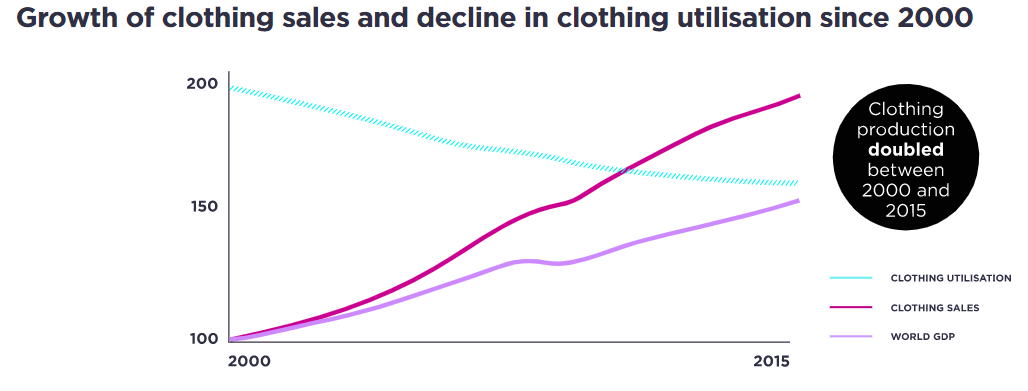🌱 AYM's spin on slow fashion, and your primer on the Green Claims Directive.
Featuring Bold Bean Co, COOK, Sapling Spirits, OGGS and more...
Happy Tuesday!
This week we cover:
Quick Take: The Green Claims Directive: What you need to know about the EU’s current proposal.
Brand Spotlight: Introducing AYM: The UK-based brand labelled as “The Antidote to Fast Fashion”.
In case you missed it: 🌱 World Circular Textiles Day: A 3 Phase Plan, and Bedstraw & Madder's Regenerative Business Model.
> Good News Last Week
🎯 Sapling Spirits kickstarted their ‘Wonky Fruit Range’ by launching a Raspberry and Hibiscus Vodka. They’re using misfit fruit that doesn’t make premium grade specifications for appearance, weight and colour.
🎯 Pip & Nut announced they’re now certified carbon neutral, by investing in two Verra approved projects in Indonesia. They’ve worked with South Pole to measure their footprint, and have committed via Science Based Targets initiative (SBTi) to be Net Zero by 2040.
🎯 Bold Bean Co announced they’re now a certified B Corp.
🎯 COOK announced that in the 12 months to the end of March, they achieved their lowest ever Carbon Intensity (CO2 per million pounds of sales) - down 25% on their baseline from 2017/18. They also revealed that despite sales rising last year by 11.6%, their overall carbon footprint was 2.5% lower.
🎯 OGGS announced that since their launch they’ve saved 5 million eggs, saving almost 300 tonnes of CO2e.
🎯 Notpla announced its takeaway boxes are now being sold in Belgium on the Takeaway.com platform. Notpla’s boxes are lined with seaweed coating, rather than plastic / PFA coating.
🎯 PEACHY DEN announced they’ve partnered with SOJO, providing customers with a built in function on the brands website which allows them to alter their purchases.
⭐️ Albert Heijn, the largest Dutch supermarket chain, is piloting a ‘true pricing initiative’ at 3 convenience stores. When customers by coffee, they’ll see two prices - the standard retail price or the true price, which factors in CO2 emissions, water use, resource consumption and labor conditions. This was developed in partnership with True Price, and all extra revenue will go to Rainforest Alliance projects.
⭐️ Tesco announced they’re switching from Use By to Best Before dates on over 30 own brand yoghurts, in a bid to tackle food waste. 70% of yoghurts thrown away at home are still good to eat.
⭐️ Waitrose announced it will become the first UK supermarket to trial wine bottles without plastic or foil sleeves typically found around the neck. This is estimated to save half a tonne of unnecessary packaging per year.
⭐️ M&S announced it’s introducing recyclable packaging for rice, grains and pulses - saving an estimated 5.5 million pieces of plastic a year.
⚡️ The European Parliament approved a landmark deforestation law to ban imports to the EU that come from any land that was deforested since 31st December 2020. This will apply to soy, beef, palm oil, wood, coffee and more.
> Click on each link to read more.
> Quick Take
The Green Claims Directive: What you need to know about the EU’s current proposal.
Back in March, we looked at ‘greenhushing’ - when brands under report on sustainability with the aim of avoiding scrutiny (read our full digest here). Shortly after, the EU took its first steps in providing clarity to businesses who aren’t sure what claims they can and can’t make, by proposing the Green Claims Directive (GCD). The proposed directive aims to regulate green claims with detailed rules on substantiation, verification and communication of voluntary claims and environmental labels.
Why? With the Consumer Protection Cooperation authorities finding that 53.3% of sustainability claims assessed in a survey provided vague or misleading information about a product’s environmental characteristics, theres no doubt that greenwashing is a problem. The GCD aims to ‘protect consumers’ and empower them to make better (more sustainable) decisions and actively contribute to the green transition through market transparency with ‘established harmonised calculations and methods covering the full value chain’. Tackling false environmental claims is no doubt a big step forward for industry-wide transparency.
While the Green Claims Directive is currently only a proposal and the final details might differ once it has passed into EU legislation, let’s dig into what you and your sustainability team need to know now to get your business ready…
What is being proposed?
Verification of environmental claims will be mandatory. Claims must be verified by an independent body with regulatory expertise to ensure compliance with the rules. While the proposal sets out plans to ensure that smaller businesses are not disproportionately affected by costs, all businesses will have to bear the costs of claims and the cost will depend on the type of claim.
There are tighter restrictions on how claims are evidenced. All claims must be based on scientific evidence from a life cycle perspective. When comparing products, any comparative claims (less/more environmental impact) must include the equivalent scientific information for the compared products. Weblinks or QR codes will have to include certificates to verify the claim.
Different claims require different levels of sufficient evidence to establish the validity of claims. While no single methodology is given yet, all claims must include primary, company-specific data. For comparative claims more complex data is required.
Environmental claims must be revisited every five years. The substantiation and communication of claims must be reviewed and updated to guarantee compliance.
There will be penalties for non-compliance. Fines will be at least 4% of your company’s annual turnover. Penalties will also include the confiscation of revenue gained from transactions of the relevant products, plus bans from public procurement and public funding of up to 12 months.
How is your brand affected?
Getting your business compliance-ready for when this proposal becomes legislation has benefits for your business right now. Consumer trust in environmental claims is undoubtedly low, and greenwashing brings the risk of reputational and financial damage, so substantiated and verified claims build credibility for your business and confidence with your consumer. The proposal also gives your business the opportunity to contribute to Sustainable Development Goal 12.6, encouraging companies (especially large and transnational ones) to adopt sustainable practices and integrate sustainability information into their reporting cycle.
> Brand Spotlight
Introducing AYM: The UK-based brand labelled as “The Antidote to Fast Fashion”.
According to the Ellen MacArthur Foundation, a truckload’s worth of clothes is burned or sent to landfill every second. While clothing production rates have doubled, clothing’s utilization rate (number of times clothing items are worn) has dropped. Both these statistics are primarily attributable to fast fashion: an increase in trend turnover coupled with a decrease in clothing quality to lower the price tag. To put a figure on it, around half of clothing items produced in fast fashion are disposed of within a year. What’s worse? The textile industry is incredibly resource intensive and is the fourth major sink after food, housing and transportation. From a social perspective, the fashion industry’s reputation is no better. Big retailers often have their production facilities in countries with extremely low wages, limited trade union representation, and poor working conditions.

Not one single fashion brand will put an end to this reinforcing (washing) cycle. Instead, collective efforts are needed from consumers, fashion brands, and government regulations to enforce transparency across fashion supply chains.
A company promoting the opposite of fast fashion - slow fashion - is AYM. The Sussex-based fashion brand embodies environmental and social sustainability values throughout their business model, producing all their clothing in the UK based on demand.

A few ways AYM is getting it right:
Their items are produced on a pre-order basis, meaning that they produce in bulk once they have built up enough orders. This limits fabric waste and matches supply to demand. This process is especially important for new styles to measure market demand.
They’ve partnered with SOJO, a London-based door-to-door tailoring service, which collects clothing items from you and returns them in only a few days. This partnership ensures that clothing items fit perfectly, reducing the chance of them being returned (or sitting at the back of a cupboard only for them to be disposed of shortly after purchasing).
They have a ‘Climate Positive Workforce’ through their partnership Ecologi, which offsets the carbon emissions of the AYM staff members. Thanks to this partnership, AYM has avoided 50 tonnes of carbon dioxide-equivalent emissions!
They’ve worked with World Land Trust to purchase and protect 141 acres of threatened habitat, placing it in the care of conservation partners.
From a social perspective, AYM is committed to paying their workers a real Living Wage (above the national minimum) and is held accountable through Living Wage Brighton.
Building a ‘Made to Last’ business
AYM is honest about their sustainability limitations (they are currently in the process of transitioning away from their Polyester/Elastane fabric), but choose transparency over perfection to show the changes they are making, whilst still being held accountable. We’re not the only fans - they’ve even won Sussex Business Award's Small Business of the Year. We can’t wait to see what they achieve next.
Take a closer look at AYM:

> In case you missed it
🌱 World Circular Textiles Day: A 3 Phase Plan, and Bedstraw & Madder's Regenerative Business Model
Featuring Faith in Nature, Levh, DL1981, Virón, Strong Roots and more...
> Follow up with…
Article: Addressing Fashion’s Footprint at Farm Level Through Verified Sustainability Data
Article: Sustainable Apparel Coalition launches fashion industry decarbonisation guide
Report: Citizen Insights: Clothing Longevity and Circular Business Models Receptivity in the UK
Event: Bread & Jam’s Future Summit - 23rd May - 30% discount on tickets with FOLLOWING30!



